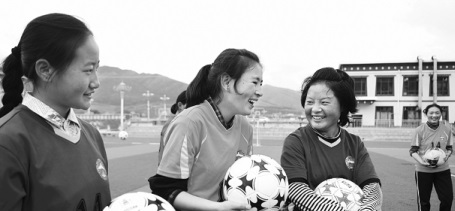Tibetan middle school gives lessons in opportunity

Students at the Luqu Tibetan Middle School in Luqu county of Gannan Tibet autonomous prefecture, Gansu province, enjoy soccer training. The school has more than 20 varied student clubs to help them expand their horizons. [Photo/Xinhua]
Walking into Luqu Tibetan Middle School, you will be impressed by the students' diverse activities, ranging from programming, robot making, to traditional Tibetan dancing and painting.
Surrounded by mountains, the school is located in the Luqu county of Gannan Tibet autonomous prefecture, in Northwest China's Gansu province. The boarding school, with 2,520 Tibetan students in total, has a curriculum highlighting learning of the Tibetan language, arts and culture.
The school has more than 20 student clubs, like robotics, Tibetan opera performance, thangka painting, soccer and other sports, to help the students, many from herding and farming families, expand their horizons.
To young Tibetans, learning thangka-Tibetan Buddhist scroll paintings-is more about inheriting their ethnic culture and tradition, and it also serves as an entry ticket to their desired universities. Originating in the 10th century and created on cotton or silk, with mineral and organic pigments derived from coral, agate, sapphire, pearl and gold, the paintings depict Tibetan Buddhist deities with colors that can remain intact for centuries.
Students may not have mastered the splendid skills of painting thangka or have access to traditional pigments, but they are willing to learn the basic techniques of drawing, while they also get acquainted with Tibetan Buddhist stories, depicted in these paintings.
Zhoima Tso has been attracted to the art since childhood. "You can easily find a thangka painting in a Tibetan home, since it is so important to us," says the 18-year-old student. "I feel really proud that our school provides us with so many Tibetan culture classes, and now I'm so into thangka that I'd like to study it as a major in college."
Like her, more than 100 students study thangka painting skills at the school, half of whom are preparing for exams to receive higher education as art students.
"The thangka painting major at the Qinghai Nationalities University is well-known, and we have many students enrolled in this university every year," says Lama Gya, a thangka-painting teacher. "I've been teaching at this school for 15 years, and I'm pleased that my students can continue to learn what they really like and incorporate Tibetan culture for the future."
Besides the painting class, the robotics club has also become a hit among these young Tibetan boys and girls.
Tamdrin Tashi and his four teammates are installing a trash-sorting robot, which can automatically identify categories of rubbish. They have even added sound effects to make the robot sound like a real trash truck.
"I learned programming for half a year under the guidance of our teachers. Now the robots can identify and separate trash into bins, according to different categories," he says.
More than 30 students have joined the robotics club, and they have classes four days a week. Despite a lack of professionals, teachers at the school are satisfying their students' thirst for knowledge with passion and a sense of responsibility.
"I didn't know how to program a robot at first, but when we learned that there was an opportunity for our students, I, along with another teacher, immediately got into programming. We then taught what we learned to our students," says Gonpo Norig, a physics teacher at the school, who now coaches the robotics club.
The school bought the robot-making facilities from a company in Lanzhou. "For a school in such a small county, we didn't expect to have these facilities, but our principal supported our students. He wanted them to see the technologies, which are commonly seen at schools in Beijing or Shanghai, with their own eyes," says Gonpo Norig.
"We also host knowledge contests about Tibetan herding and farming culture, in a bid to remind our students of their own ethnic tradition," says Konchokhu Cedain, principal of the middle school, adding that they hope students will become inheritors of Tibetan tradition and culture.
